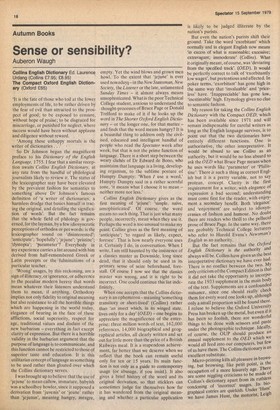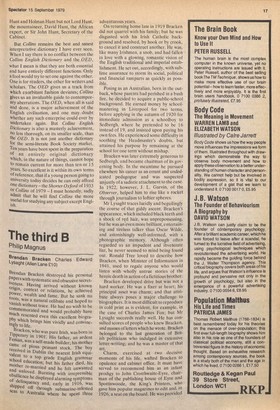Autumn Books
Sense or sensibility?
Auberon Waugh
Collins English Dictionary Ed. Laurence Urdang (Collins E7.95; £8.95) The Compact Oxford English Dictionary (Oxford £65) 'It is the fate of those who toil at the lower employments of life, to be rather driven by the fear of evil than attracted to the pros pect of good; to be exposed to censure, without hope of praise; to be disgraced for miscarriage, or punished for neglect, where success would have been without applause and diligence without reward.
'Among these unhappy mortals is the writer of dictionaries . . .
So Dr Johnson began the magnificent preface to his Dictionary of the English Language, 1755. I fear that a similar reception awaits Collins English Dictionary, at any rate from the handful of philological journalists likely to review it. The status of the lexicographer may have been elevated by the prevalent fashion for semantics to something above Dr Johnson's famous definition of 'a writer of dictionaries; a harmless drudge that busies himself in tracing the original, and detailing the signification of words'. But the fact remains that the whole field of philology is governed, for the layman, by a few idiosyncratic perceptions of orthodox or pet words: is the lexicographer sound on 'disinterested'; 'anticipate'; 'hopefully': `jejune'; 'pristine'; 'dystopia'; 'parameter'? Everybody in my experience carries alist around with him derived from half-remembered Greek or Latin precepts or the I fulminations of a particular teacher.
'Wrong' usages, by this reckoning, are a sign of illiteracy, or ignorance, or adherence to the peculiar modern heresy that words mean whatever their listeners understand, them to mean, if anything. Orthodoxy implies not only fidelity to original meaning but also resistance to all the horrible things which are happening in the world today, elegance of bearing in the face of these afflictions, social superiority, respect for age, traditional values and disdain of the new barbarism — everything in fact except clarity of expression. But there is a horrible validity in the barbarian argument that the purpose of language is to communicate, and this function cannot be restricted to those of superior taste and education. It is this utilitarian concept of language as something to be used rather than gloated over which the Collins dictionary serves.
I was brought up to believe that the usc of 'jejune' to mean callow, immature, babyish was a schoolboy howler, since it supposed a derivation from `juvenis' or `jeune' rather than lejunus', meaning hungry, meagre, empty. Yet the wind blows and grown men howl. To the extent that 'jejune' is ever used nowaday§— in the New Statesman, New Society, the Listener or the late, unlamented Sunday Times — it almost always means unsophisticated. What is the poor Technical College student, anxious to understand the thought-processes of Bruce Page or Donald Trelford to make of it if he looks up the word in The Shorter Oxford English Dictionary — or the longer one, for that matter — and finds that the word means hungry? It is a beautiful thing to address only the civilised, educated and intelligent handful of people who read the Spectator week after week, but that is not the prime function of language. There is a short step between the weary clichés of Dr Edward de Bono, who maintains that language is a living, develop ing organism, to the sublime posture of Humpty Dumpty: 'When / use a word,' Humpty Dumpty said in a rather scornful tone, 'it means what I choose it to mean — neither more nor less.'
Collins English Dictionary gives as the first meaning of 'jejune': 'simple, naive, unsophisticated'. Of course, the word means no such thing. That is just what many people, incorrectly, mean when they use it. Perhaps the word is too unusual to make my point. Collins gives as the first meaning of 'anticipate'; `to regard as likely, expect, foresee'. That is how nearly everyone uses it. Certainly I do, in conversation. When I write, I am still haunted by the insistence of a classics master as Downside, long since dead, that it should only be used in its primary sense of seize beforehand, forestall. Of course I now see that the classics master was wrong, and it is right to be incorrect. One could continue this list indefinitely.
When one accepts that the Collins dictionary is an ephemeron — meaning 'something transitory or short-lived' (Collins) rather than 'an insect which, in its winged state, lives only for a day' (OED)— one begins to appreciate the magnificence of the enterprise: three million words of text, 162000 references, 14,000 biographical and geographical articles, all clearly written and set out for little more than the price of a British Railways meal. It is a stupendous achievement, far better than we deserve when we reflect that the book can remain useful only for ten or 15 years. Its main function is not only as a guide to contemporary, usage (or abusage, if you insist). It also gives a brief history of the word and its original derivation, so that sticklers can sometimes judge for themselves how far it has wandered from the original meaning and whether a particular application is likely to be judged illiterate by the nation's purists.
But even the nation's purists shift their ground. Take the word 'exorbitant' which normally and in elegant English now means 'in excess of what is reasonable; excessive; extravagant; immoderate' (Collins). What it originally meant, of course, was 'deviating from the specified track'. (OED). It would be perfectly correct to talk of 'exorbitantly low wages', but pretentious and affected. In poker terms, 'exorbitant' has gone high in the same way that 'invaluable' and 'priceless' have. 'Inappreciable' has gone low, 'inestimable' high. Etymology gives no clue to semantic fashion.
My reason for taking the Collins English Dictionary with the Compact OED, which has been available since 1971 and will remain indispensable for careful writers as long as the English language survives, is to point out that the two dictionaries have entirely different functions. One is authoritative, the other interpretative. It would be absurd to use Collins as an authority, but it would be no less absurd to ask the OED what Bruce Page means when he uses words like 'parameter' or 'Philistine'. There is such a thing as correct English but it is a pretty variable, not to say protean, concept. Clarity is the first requirement for a writer, with elegance of expression a bad second; understanding must come first for the reader, with enjoyment a secondary benefit. Both 'elegance' and 'enjoyment' are subject to idiosyncrasies of fashion and humour. No doubt there are readers who thrill to the pellucid prose of Bruce Page. In the same way, there are probably Technical College lecturers who refer to Harold Evans's Newsman's English as an authority. But the fact remains that the Oxford English Dictionary is the authority and always will be. Collins have given us the best interpretative dictionary we have ever had. There is no conflict between the two. My only criticism of the Compact Edition is that it did not take the opportunity to incorporate the 1933 supplement in the main body of the text. Supplements are a confounded nuisance, since one should really check them for every word one looks up, although only a small proportion will be found there. I refuse to believe the Oxford University Press has broken up the metal, but even if it has been so foolish, there are wonderful things to be done with scissors and paste under the photographic technique. Ideally, of course, the OUP should produce an annual supplement to the OED which we would all feed into our computers, but few of us have them. The Collins dictionary is an excellent substitute. Micro-printing kills all pleasure in browsing, but browsing, like petit point, is the occupation of a more leisurely age. There are some niggling criticisms to be made of Collins's dictionary apart from its ruthless condoning of 'incorrect' usages. Its biographical entries are quirkish. Under 'Hunt' we have James Hunt, the motorist, Leigh Hunt and Holman Hunt but not Lord Hunt, the mountaineer, David Hunt, the African expert, or Sir John Hunt, Secretary of the Cabinet.
But Collins remains the best and sanest interpretative dictionary I have ever seen. When I say there is no conflict between the Collins English Dictionary and the OED, what I mean is that they are both essential and have entirely different functions. Only a fool would try to set one against the other. One is for readers, the other for writers and scholars. The OED gives us a track from which exorbitant fashion deviates; Collins gives us an invaluable guide to contemporary aberrations. The OED, when all is said and done, is a major achievement of the English civilisation, and one may doubt Whether any such enterprise could ever by undertaken again. But Collins English Dictionary is also a masterly achievement, no less thorough, on its smaller scale, than the OED. It is not just another dictionary for the semi-literate Book Society market. Ten years have been spent in the preparation of an entirely original dictionary Which, in the nature of things, cannot hope to remain current for more than tell or 15 years. So excellent is it within its own terms of reference, that if a young person going to university today decides he can only afford one dictionary — the Shorter Oxford of 1933 or Collins of 1979 — I must honestly, sadly admit that he will find Collins the more useful for studying any subject except English,



































 Previous page
Previous page